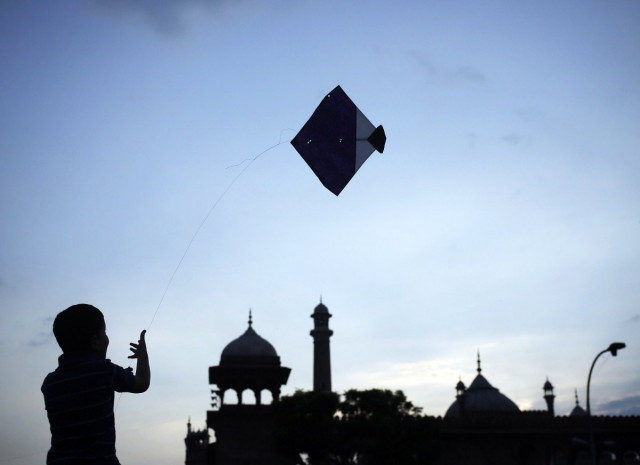‘Bloody’ kite-flying continues to claim lives in Lahore
In the latest incident, fresh graduate was riding a motorbike when a kite string slit his throat open

Asadullah, 23, was riding a motorbike in Lahore when a stray kite string slit his throat open, killing him on the spot.
A fresh graduate from university, who had joined his maiden job just three days before his death, was the latest victim of the throat-slitting incidents, which have already claimed hundreds of lives and injured as many over the past few decades.
According to police, 25 people, mainly children, lost their lives, and 47 others were injured in similar incidents last year in Lahore, the cultural capital of Pakistan.
The deaths and injuries are caused by the use of sharp glass-coated strings used specifically for kite-flying.
Kite-flying is the centerpiece of a popular festival known as Basant, celebrated in both Indian and Pakistani Punjab provinces, to welcome Spring every year.
In recent years, the game has suffered bans in Pakistan as the government deems it dangerous.
The first ban came in 2007 following the deaths of hundreds of people — mostly children.
Despite the official ban, kite-flying could not be fully controlled by the authorities as kite-lovers continued celebrating the festival amid arrests and deaths.
The deaths coincided with a period when the festival had become increasingly popular in Pakistan, spreading from its historical home in Lahore to other parts of the country.
But the sharp, often metal, strings used to detach kites during kite fights killed several children by cutting their throats, sparking countrywide anger that forced the government to ban the festival from taking place in main cities.
Basant was taken to its zenith by former military ruler Gen Pervez Musharraf, who made it an international event between 2004 to 2008. The event promoted Lahore as the country's cultural hub and prompted citizens to rent out the roofs of their homes for use in kite-flying events throughout the month.
Deaths go unabated even at nights
Police have arrested over 10,000 people for violating the kite-flying ban in Lahore alone this year, according to a Lahore police spokesperson.
The last casualty was reported at midnight as revellers nowadays fly kites at night to avoid being spotted and arrested.
In 2018, the Punjab government had announced to lift the ban from kite-flying during the Basant festival, however, it was forced to back out due to pressure from citizens, especially the victims' families.
Zilfiqar Ali, a former organiser of the Lahore Basant festival, holds 'Lahoris' — a term to designate citizens of Lahore — responsible for the ban by continuously violating the rules.
"Previously, I used to oppose the ban but now I support it until there is safe and healthy kite-flying," Ali said, adding that the growing number of people and vehicles, mostly motorbikes, have made kite-flying further risky.
Speaking to Anadolu Agency, he observed that in the given circumstances, kite-flying is possible only at designated spots, preferably sprawling grounds.
"But I don't think the government is going to accept even this idea as all concerned authorities, especially the police, want a complete ban on the game due to continuing mishaps," he added.
"Basant became a popular festival worldwide, which used to inject billions of rupees into the country's economy every year.
"But it's over now. And we ourselves are responsible for that," Ali fumed.
Punishments need to be increased
For many, especially in Punjab, kite-flying runs in their blood and the ban does not deter them as is seen during the months of February and March where the skies are decorated with kites.
In addition to deaths by sharp strings, fatal road accidents, and stampedes during the run to catch the kites cut-down in fights, also claim several lives.
Also, there have been clashes between boys claiming their rights on landing kites.
The more kites one picks, the more praise he concedes from his colleagues. And more significantly, the “looted” kites are bought by the village elders and revellers at a good price.
The dual temptation for money and praise propels more children and young boys to run for the kites, which sometimes turns out to be a bloody affair.
In January this year, the Lahore police, sent a proposal to the Punjab government, suggesting an increase in the existing punishments to curb the life-threatening activity. The proposal, nonetheless, was rejected.
“The police are trying its best but we need support from the government and the society to contain this dangerous activity,” a senior Lahore police official told Anadolu Agency wishing not to be named.
The existing kite-flying act, he pointed out, holds meagre fines or light punishments for the violators, who are released on the very next day on bail or against a small fine.
“The society by and large still considers kite-flying a game and part of their culture. Therefore, it’s hard to completely stamp it out, “ the official said adding that the area people resist and protect the violators when the police try to arrest them. “
“We cannot deploy policemen at every rooftop or street. The society has to play a role to contain the casualties and injuries.”





1733130350-0/Untitled-design-(76)1733130350-0-208x130.webp)













COMMENTS
Comments are moderated and generally will be posted if they are on-topic and not abusive.
For more information, please see our Comments FAQ